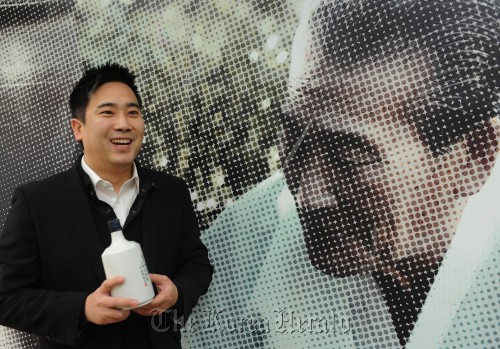Intangible cultural heritage heir looks to international markets
Soju has long been a favorite drink of Koreans across all spectrums of society. Its crisp, bittersweet flavor and relatively low price often tempt all from the rank and file to CEOs and presidents in times of economic crisis and personal struggle.
Moonbaesool Brewery Co.’s hand-made soju is one of the oldest distilled liquors here, dating back over 150 years. The traditional drink, which was first made using water from Daedong River in Pyongyang, played a part in thawing inter-Korean relations when former president Kim Dae-jung made a toast at the historic 2000 summit meeting with late North Korean leader Kim Jong-il.
Lee Seung-yong was first shown the secret recipe of Moonbaesool as a small boy by his late grandfather Lee Kyung-chan, and then his father Lee Ki-choon. At 17, he as a fifth-generation heir formally set out to carry on the family business, which was designated an important intangible cultural asset in 1986.
Soju has long been a favorite drink of Koreans across all spectrums of society. Its crisp, bittersweet flavor and relatively low price often tempt all from the rank and file to CEOs and presidents in times of economic crisis and personal struggle.
Moonbaesool Brewery Co.’s hand-made soju is one of the oldest distilled liquors here, dating back over 150 years. The traditional drink, which was first made using water from Daedong River in Pyongyang, played a part in thawing inter-Korean relations when former president Kim Dae-jung made a toast at the historic 2000 summit meeting with late North Korean leader Kim Jong-il.
Lee Seung-yong was first shown the secret recipe of Moonbaesool as a small boy by his late grandfather Lee Kyung-chan, and then his father Lee Ki-choon. At 17, he as a fifth-generation heir formally set out to carry on the family business, which was designated an important intangible cultural asset in 1986.

“I spent a tremendous amount of time with my grandfather was I was young,” Lee, 36, told The Korea Herald in a recent interview. “I was trained bit by bit while helping him make a fire in the stove and adding ingredients like malted wheat and millet, and grew familiar with it during that process.”
Though sharing the same main ingredients with Jinro’s popular Chamisul and Lotte Liquor BG’s Chum-Churum, Moonbaesool is a whole different breed, Lee claims.
Its name was derived from its scent ― the soju smells like Korean wild pear, “Moonbae,” or its blossoms. While its bigger peers offer colorless and low-proof sojus, Moonbaesool has a light golden color and boasts a rich, velvety sweetness on the first sip, followed by a dash of fiery heat pointing to its 40 percent alcohol content.
Mindful of the predominant shift to milder sojus, the Lees introduced new products with 23 and 25 proofs in recent years. Still, the 40-proof version reigns supreme, Lee says.
“As for regular brands, you can’t hold it in your mouth because of their strong alcohol odor, which is why most people drink it down at once, rather than take time and savor its taste. But our soju is meant to be swallowed slowly, as it’s second to no whiskies or any other spirits in terms of fragrance and tenderness with the same alcohol content,” he says.
To cater to soaring demand for Korean beverages and carve out a niche in the international market, Moonbaesool is striving to localize its products and beef up partnerships with overseas distributors.
The Gimpo, Gyeonggi Province-based distiller currently operates offices in the U.S., Japan, China and Hong Kong. Exports account for about 20 percent of sales, which touched 3 billion won ($2.7 million) last year.
Targeting Hong Kong customers, Lee spent five years developing a yuzu-based rice liquor, which started rolling out in the fourth quarter of 2011. As for the Chinese market, he set his sights on the super-premium segments.
“We’re looking far into the future,” Lee says. “It could take 10 years to settle down in any new market for a newcomer. Ten years ago, international customers had even no idea what makgeolli is. We will stay focused on marketing and localization for some time.”
Major Korean breweries and distilleries such as Kooksoondang and Hite-Jinro are stepping up efforts to promote local specialty drinks at home and abroad as the ripening market boosts demand for more sophisticated and diverse products.
Exports of makgeolli, a rice-based Korean drink, topped $50 million last year on the back of its surging popularity in Japan and China, according to the Korea Customs Service.
In a bid to rejuvenate Moonbaesool’s image and lure younger customers, Lee, an avid user of Apple Inc.’s products, lately revamped the company’s website. He also plans to adopt more open marketing strategies such as using Facebook and Twitter in the first half of this year.
“We are small in scale and may lag behind big manufacturers in swiftly coping with swings in the market, but we have a solid and faithful base of fans who have been choosing us solely for the consistent taste of the liquor,” Lee said.
“We’ll transform slowly but faithfully into a leader in a niche and continue to expand communications with more customers.”
By Shin Hyon-hee (heeshin@heraldcorp.com)


















![[Today’s K-pop] Treasure to publish magazine for debut anniversary](http://res.heraldm.com/phpwas/restmb_idxmake.php?idx=642&simg=/content/image/2024/07/26/20240726050551_0.jpg&u=)